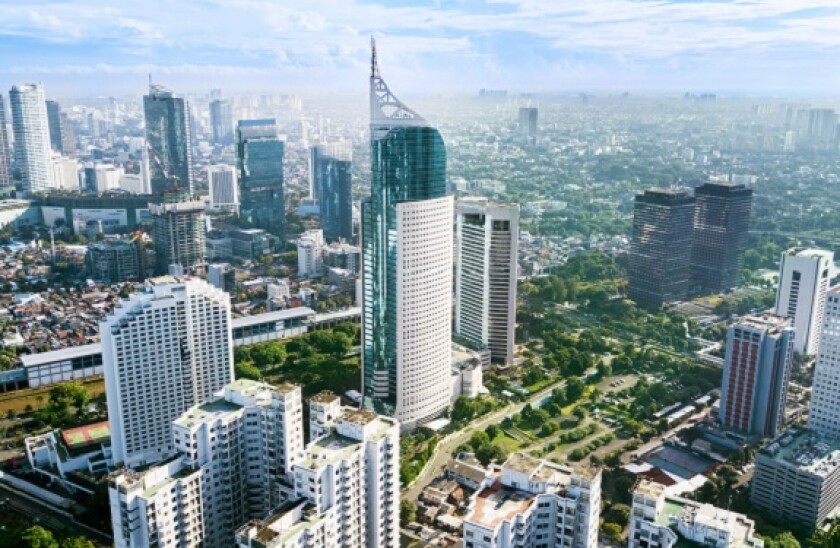The Republic of Indonesia is known for being one of the savviest emerging market sovereign borrowers, approaching the offshore market each year to sell sukuk, green and conventional bonds in G3 currencies. The deals are, without fail, snapped up by investors, reflecting their nearly insatiable appetite for quality issuers with a solid track record in the debt market.
This year only cemented Indonesia’s credentials further. The Ministry of Finance sold a dollar and euro combination deal in January, a $4.3bn Covid-linked trade in April, a green and conventional sukuk in June and a Samurai bond in July.
The April transaction, which included a first 50 year tranche from an Asian sovereign, proved to be especially important for two reasons: it reopened the region’s debt market after it shut when the Covid-19 pandemic spread globally, and it marked the first Asian sovereign bond linked to Covid relief efforts.
The transactions from Indonesia, rated Baa2/BBB/BBB, also serve as a bellwether for its corporations — particularly the state-owned enterprises (SOEs) that managed to leave a mark in the international debt market this year.
Without the sovereign bond setting a strong benchmark, it would have been much more challenging for the SOEs, reckons Sean Henderson, co-head of debt capital markets, Asia Pacific, at HSBC.

PLN
Deals from the country’s corporations saw a spectacular reaction from global investors. Take Indonesian electricity company Perushaan Listrik Negara (PLN), which was one of the government-owned names to follow the sovereign into the dollar market in 2020. The borrower went offshore in June with 10 year and 30 year bonds, raising $1.5bn between them. The deal was a blowout as the combined order book hit $11.1bn at its peak.
That allowed PLN to raise more than expected, and the 3% 2030 and the 4% 2050 notes were both sold about 20bp inside of fair value. The coupon on the 2030 bond was the lowest ever for PLN, and for any Indonesian corporation at the time.
"Everyone was concerned about the impact of Covid on the business," says Sinthya Roesly, director of finance at PLN. "We had intense conversations with investors."
PLN was able to sell its story by pointing to the government's support of not only its business but of consumers as well. Investors were able to see PLN's importance, given it supplies electricity to the country, and understood that even as some Indonesians may struggle to pay their electricity bills, the government will use subsidies to keep PLN functioning, adds Roesly.
"That is one of the factors that investors value," says Roesly of the government support. "Even though Covid has a downside risk, in terms of cash flows and support of the government, [investors] can see they are there for PLN."
That comfort has worked in the favour of other SOEs as well. For instance, quasi-sovereign construction firm Hutama Karya was able to debut in the dollar market in May, raising $600m from a 10 year note. Mining company Indonesia Asahan Aluminium (Inalum) sold a $2.5bn triple-tranche bond in May, and saw demand of an impressive $15.9bn at reoffer.
In the wake of Covid, the SOEs were proactive in raising funds necessary to keep the economy moving forward, says Henderson.
It helped that investor liquidity remained high, even as global interest rates fell on the back of Covid, he adds. This drove many investors, particularly those from the insurance sector, to look for duration, allowing Indonesian SOEs to print deals at longer tenors with historically low coupons.
"The one word for Indonesia really is 'optimism'," says Roesly.

T Rowe Price
Investors know that SOEs always have a backstop when it comes to their ability to access funding, reckons Sheldon Chan, portfolio manager of T Rowe Price's Asian credit bond strategy in Hong Kong. These companies, while they may vary in how much government support they receive, will have preferential access to the state banks and business activities and contracts, in addition to being eligible for capital injections. PLN and state oil and natural gas company Pertamina, which sold a $1.45bn trade in February, are two clear examples of government-backed names that have benefitted from their state ties, says Chan.
"You can see that in the way spreads for these credits have moved," he explains.
The duo are back to their pre-Covid spreads over the sovereign, after having seen their spreads widen significantly in March. PLN and Pertamina's notes were trading well above reoffer in the secondary market in mid-December, according to Bondsupermart.
"The market has gained confidence and faith [in these companies]," says Chan.
Investors feel that the country's ministry of finance has been prudent and effective in its actions to mitigate the impact of the pandemic — something that has been reflected in the outstanding response that SOEs have received in the offshore market despite the pandemic backdrop, adds Roesly.
Even state-linked credits that haven't received as much government support as PLN, which is deemed to be a critical business, have still been embraced by investors.
"The view toward Indonesia as a target of investment is positive," says Roesly. "It's a combination of the confidence in the economy and the corporations themselves."
Roesly adds that the government and SOEs have demonstrated their ability to face the health crisis head on and given investors comfort that Indonesia can handle the fallout from Covid-19 in the coming months.

